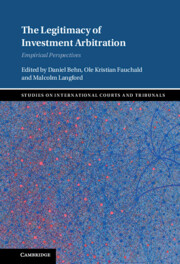Book contents
- The Legitimacy of Investment Arbitration
- Studies on International Courts and Tribunals
- The Legitimacy of Investment Arbitration
- Copyright page
- Contents
- Figures
- Tables
- Contributors
- 1 Introduction: The Legitimacy Crisis and the Empirical Turn
- 2 The International Investment Regime and Its Discontents
- Part I Process Legitimacy
- Part II Process Legitimacy
- 7 Foreign Investors, Domestic Courts and Investment Treaty Arbitration
- 8 Ensuring Correctness or Promoting Consistency? Tracking Policy Priorities in Investment Arbitration through Large-Scale Citation Analysis
- 9 Fair and Equitable Treatment: Ordering Chaos through Precedent?
- Part III Output Legitimacy
- Part IV Legitimation Strategies
- Index
7 - Foreign Investors, Domestic Courts and Investment Treaty Arbitration
from Part II - Process Legitimacy
Published online by Cambridge University Press: 06 January 2022
- The Legitimacy of Investment Arbitration
- Studies on International Courts and Tribunals
- The Legitimacy of Investment Arbitration
- Copyright page
- Contents
- Figures
- Tables
- Contributors
- 1 Introduction: The Legitimacy Crisis and the Empirical Turn
- 2 The International Investment Regime and Its Discontents
- Part I Process Legitimacy
- Part II Process Legitimacy
- 7 Foreign Investors, Domestic Courts and Investment Treaty Arbitration
- 8 Ensuring Correctness or Promoting Consistency? Tracking Policy Priorities in Investment Arbitration through Large-Scale Citation Analysis
- 9 Fair and Equitable Treatment: Ordering Chaos through Precedent?
- Part III Output Legitimacy
- Part IV Legitimation Strategies
- Index
Summary
Supporters of ISDS often justify the continued existence of ISDS on the basis that disputes are denationalized, thus keeping foreign investors out of domestic courts which may lack independence, be less efficient, or are biased against foreigners. This justification, unwittingly perhaps, strengthens a perception that foreign investors proceed directly to the international sphere. However, this chapter finds that many investors do avail themselves of domestic courts prior to an ISDS case and asks why this is the case. Looking at two states with transitional judiciaries and two states with well-functioning judiciaries, the author uncovers a rich data on the impressive scope of claims brought by foreign investors in the host states where they are investing; and Gáspár-Szilágyi concludes with some reflections on the role of domestic litigation in the legitimation of ISDS. (This abstract needs development)
Keywords
- Type
- Chapter
- Information
- The Legitimacy of Investment ArbitrationEmpirical Perspectives, pp. 171 - 229Publisher: Cambridge University PressPrint publication year: 2022

